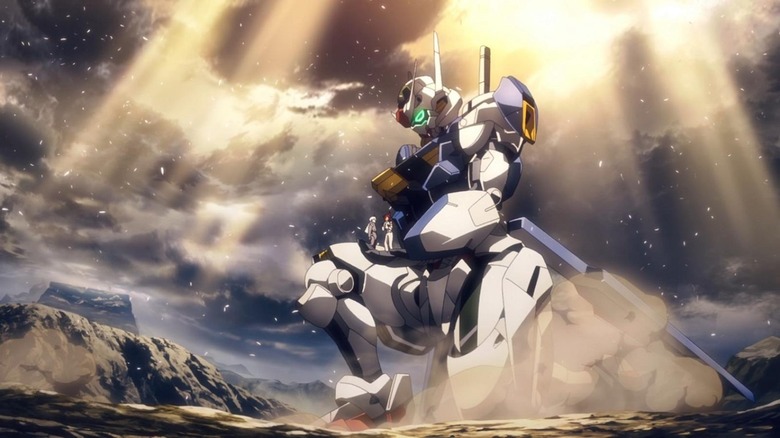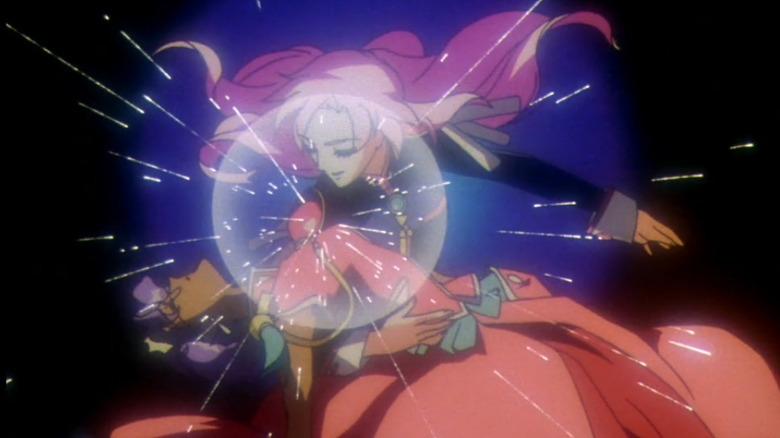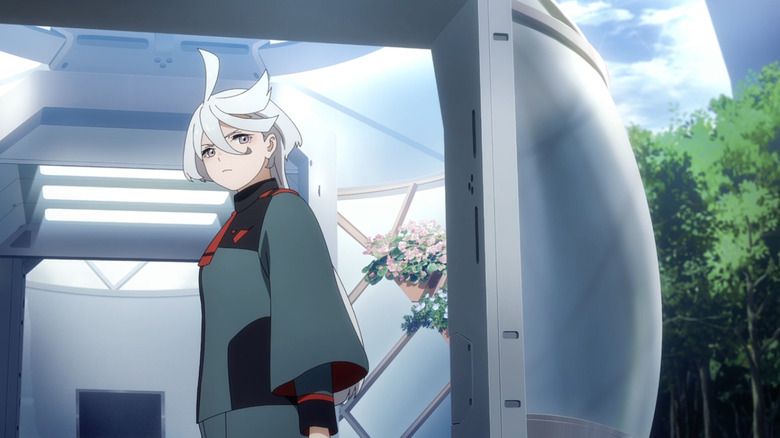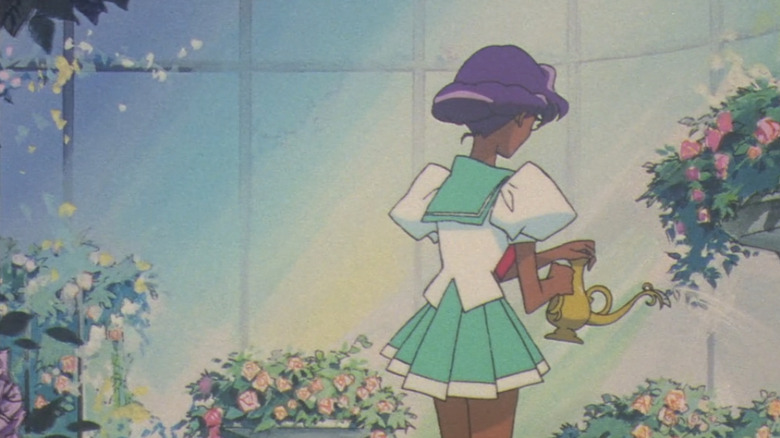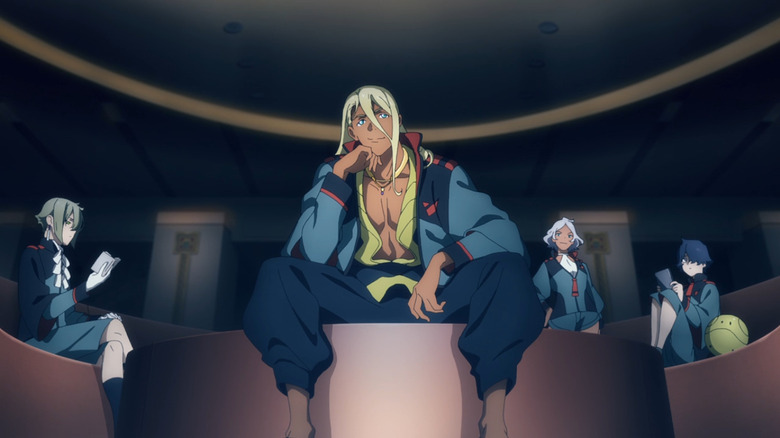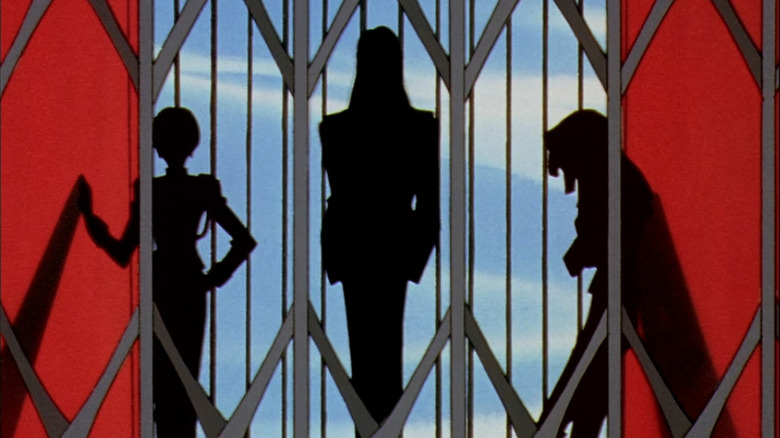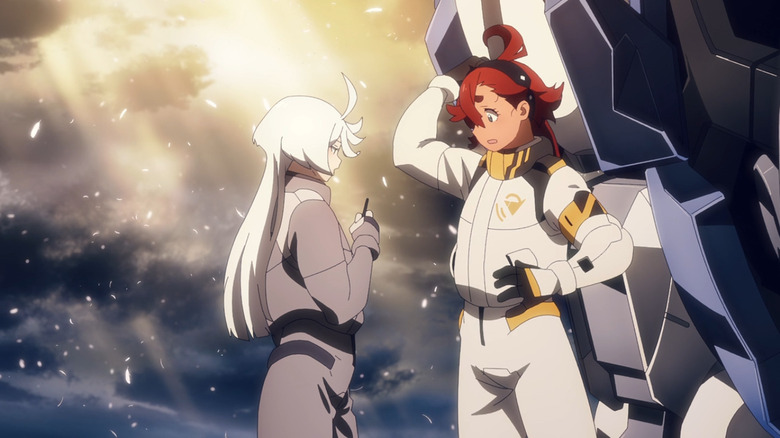Gundam: The Witch From Mercury Borrows From An Anime Classic
In some ways, the first two episodes of "Mobile Suit Gundam: The Witch from Mercury" are just what you'd expect from a new series in the "Gundam" franchise. There's a powerful robot called a "Gundam" piloted by a child soldier. Space colonies play politics with the lives of ordinary people. There's an impressive amount of 2D mechanical animation, an increasing rarity in the anime industry outside of studios like Sunrise. Most importantly, the "prologue" episode gives the heroine Suletta Mercury a first-hand demonstration of the horrors of war. The original "Mobile Suit Gundam" distinguished itself from its peers by suggesting that giant robot battles could be fought over ideology distinct from good or evil, and that innocent people could be hurt in the crossfire. "Witch from Mercury" is brighter and poppier than its predecessor, but something of that original cynicism remains.
In other ways, though, "Gundam: The Witch from Mercury" is nothing like I expected. Going into the series, I expected a "Gundam" series set in a high school. What I got instead was a scene by scene homage to one high school melodrama in particular: "Revolutionary Girl Utena."
Take my revolution
"Revolutionary Girl Utena" aired in April of 1997, created by renegade animators and directors from "Sailor Moon." Its first episode tells the story of Utena Tenjou, a young woman attending Ohtori Academy. One day she meets a mysterious girl named Anthy tending a flower garden in a greenhouse on campus. Anthy is engaged to Saionji, a member of the Student Council. Saionji physically abuses Anthy and bullies Utena's friend Wakaba, so Utena challenges Saionji to a duel. In the process, she discovers the secret behind Ohtori Academy; deep in the nearby forest at the top of a long staircase, the Student Council duel each other for Anthy's hand. After defeating Saionji by slicing the flower on his breast, Anthy says to a stunned Utena that, by the rules of the school, they are now engaged.
The first episode of "Witch From Mercury" follows these events closely. Suletta is a new student attending the prestigious Asticassia School of Technology. There she meets Miorine Rembran, whose father runs the school as well as the all-powerful Beneritt Group. Just like Anthy, Miorine owns a greenhouse, although she grows tomatoes and plants there rather than flowers. But the school's top duelist, Guel, disagrees of Miorine's hobby and knocks her plants to the ground. Suletta challenges Guel to a duel for Miorine's sake, and wipes the floor with him using her powerful Gundam Aerial. Miorine says to a stunned Suletta that, by the rules of the school, they are now engaged.
Absolute destiny apocalypse
The events described above are not without precedent in earlier "Gundam" series. "Mobile Fighter G Gundam" revolved around a martial arts competition fought by giant robots and their pilots. "Gundam Wing," one of the first series in the franchise to break through on television in the United States, begins in a prestigious school setting. The "Gundam Build Fighters" and "Build Divers" spin-offs jettison the politics in favor of exciting toy "gunpla" battles. That said, the "Utena" elements of "Witch From Mercury" are tough to ignore. Utena and Anthy-likes are common enough archetypes in anime, but other characters are reminiscent of famous "Utena" cast members like Touga and Miki. The duels of "Witch From Mercury" are fought in giant illusory spaces, just like the famous dueling arena in "Utena." The inclusion of a greenhouse, a mark of captivity in both "Witch From Mercury" and "Utena," is the smoking gun.
The answer to why "Witch From Mercury" borrows from "Utena" specifically may be traced to its writer Ichiro Okouchi. Okouchi is best known for contributing to "Code Geass," one of the greatest and most unhinged anime rollercoasters of the 2000s. More recently, he assisted Masaaki Yuasa in creating "Devilman Crybaby," a modern reboot of Go Nagai's twisted, tragic "Devilman" series. But some of his earliest works were two official "Utena" novels, featuring illustrations by "Utena" artist Chiho Saito. Okouchi himself was brought into the anime industry by Kunihiko Ikuhara, the renowned director of "Utena." His scripts for other series like "Guilty Crown" feature distinctly "Utena" flavored elements, like heroes pulling weapons out of other people's chests.
Go deeper
Borrowing characters and plot devices from "Utena" does not make an anime "Utena-like." "Utena" became an anime classic because it was a once-in-a-generation assembly of anime talent who broke as many rules as they pleased. The staff took inspiration from 1970s avant-garde playwright and filmmaker Shuji Terayama, borrowing his frequent composer J.A. Seazer to provide dueling music. The series is driven by metaphor and theme rather than by plot. The characters grapple with contradictory feelings they refuse to spell out to their friends or to the audience. The direction of the series itself plays fast and loose with the audience, hiding horrific scenes in the middle of recap episodes and punctuating serious moments with goofy animal jokes. "Revolutionary Girl Utena" is never subtle, but it demands that the viewer pays attention to fully parse its secrets.
"Witch From Mercury" is a far more conventional production than "Utena," at least in these first two episodes. The music is traditionally orchestral rather than Seazer's signature prog rock. The characters exist within concrete reality instead of the slippery dreamscape of "Utena." Miorine is an active participant who is easier to like than passive, complicit, and toxic Anthy. The series has moments of humor but never makes you laugh in sheer incredulity like "Utena" did. In short, despite its many surface similarities, "Witch From Mercury" is missing that special something present in other Ikuhara productions like "Penguindrum" and "Sarazanmai."
Smash the world's shell
The big question is how "Witch From Mercury" might approach sexuality. "Utena" has long been a favorite of LGBTQ anime fans for its handling of adolescence, gender, and sex. The television series all but confirms that Utena and Anthy are in love, and the movie has the two of them kiss naked on the bones of a car as they ride into the wreckage of the post-apocalypse. "Utena" is exponentially messier and more "problematic" than its heirs, like the critically acclaimed "Steven Universe." But then, that willingness to explore complicated feelings of love and hate is exactly why audiences keep coming back to "Utena" decades after it aired.
While Miorine calls Suletta her "fiance" at the end of the first episode of "Witch From Mercury," part of me doubts that Sunrise and Bandai-Namco will allow an explicit gay relationship to be at the center of their new moneymaking property. Anime featuring gesturing at same-sex partnerships have become increasingly popular over the years. "Yuri on Ice," a sleeper hit about two male ice skaters who fall in love, blew up to such a degree that the theme song was played at the Olympics. This year's "Lycoris Recoil" became a hit through the chemistry between its female pair of buddy cops, Chisato and Takina. But Chisato and Takina never explicitly confess their love during "Lycoris Recoil." Even "Yuri on Ice" held back on showing a direct kiss between its two leads, despite otherwise making it very clear to the audience exactly what is happening. "Witch From Mercury" might treat its central relationship in the same ambiguous manner, courting fan investment without ever committing one way or another.
The way before you has been prepared
But as folks have pointed out, "Gundam" has always been ambigiously gay. "Mobile Suit Gundam" was a flop on its original release, but grew into a sleeper hit fuelled by an active female fanbase. Just like the relationship between Kirk and Spock became a fixture of "Star Trek" fandom in the United States, Japanese fans made a meal of the homoerotic tension between "Gundam" hero Amuro Ray and his rival Char Aznable. "Gundam" founder Yoshiyuki Tomino believed the show's female fans were essential to its survival. For "Gundam" to survive, he thought, it must cater to a wide audience, not just hardcore anime fans.
"Witch From Mercury" offers a perfect opportunity to do just that. Ichiro Okouchi has written gay relationships before in "Devilman Crybaby." The director of "Witch From Mercury," Hiroshi Kobayashi, directed the high school drama "Kiznaiver" in 2016, which demonstrated an admirable (if imperfect) willingness to show adolescent life and desire from multiple angles. Okouchi and Kobayashi have their share of misses, and Okouchi especially has written scripts that are in shockingly bad taste. But if any modern "Gundam" series would assert, in defiance of Japan's conservative government, that anime fans are ready to see a same sex couple named as such on screen, I imagine it would be theirs.
One day together
That said, the aspect of "Witch From Mercury" I am most excited for is neither its references to "Utena" nor its sapphic undertones. It is the way in which the actions of the students at Asticassia School of Technology are shown to affect the lives of their parents. In the prologue episode of the series, Suletta's dad is killed in a raid orchestrated by Mirorine's father for his own political gain. In the first episode, an assassination attempt on Miorine's father is thwarted when Guel loses to Suletta in a duel. With Guel no longer in line to inherit the Beneritt Group, his family is forced to delay their attempt to seize power.
"Witch From Mercury" asks the question, "what if the dueling arena of 'Utena' was Wall Street?" As the students play childish games, their parents go for each other's throats in a never-ending succession of capitalistic power plays. By extension, the common people of this universe suffer as the military industrial complex wages war over the money. Time will tell if "Witch From Mercury" takes the time to handle these themes properly, or if it will simply coast on melodrama and fist-punching action. I imagine that the results will be entertaining either way, even if rumors suggest the staff are struggling behind the scenes to meet their deadlines. But if "Witch From Mercury" actually follows through on its promise, it could become a great series in its own right. Not as great as "Utena," but then, what is?
"Gundam: The Witch from Mercury" is now streaming on Crunchyroll.
